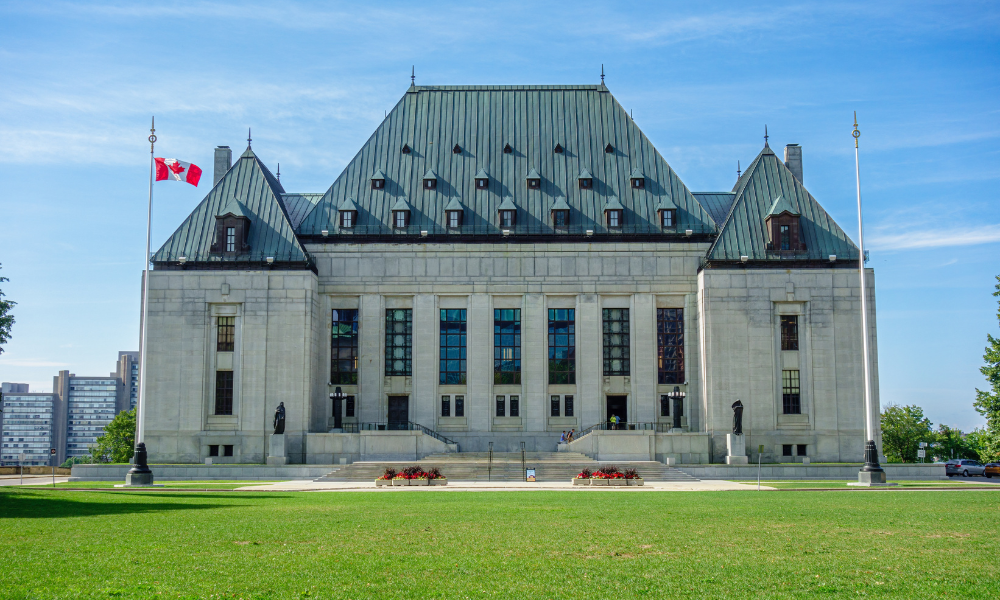
Case scheduled at Federal Court of Appeal this week involves air transportation regulations

This week, hearings scheduled before the Supreme Court of Canada, Federal Court of Appeal, and Federal Court included matters relating to sentencing, criminal procedure, admissibility of evidence, administrative jurisdiction, transportation law, privacy, and labour law.
The Supreme Court set J.W. v. His Majesty the King, 40956 on Dec. 3, Tuesday. The appellant in this sexual assault case had cognitive difficulties. He was detained in a psychiatric facility while temporarily unfit to stand trial. He pleaded guilty after withdrawing from three previous agreements to do so.
The sentencing judge set a nine-year custodial term, which was longer than what the appellant requested. The judge considered, among other factors, that the appellant’s cognitive issues required a lengthier rehabilitative programming period. The judge held that the appellant’s repeated abandonment of his agreements to plead guilty amounted to wrongful conduct.
The Ontario Court of Appeal partly allowed the appeal to correct a calculation error in the number of days spent in custody. The length of time needed to complete rehabilitative programming was just one factor impacting sentencing, the appeal court said. Evidence supported the conclusion that the repeated abandonment of guilty pleas was wrongful, the appeal court added.
The Supreme Court scheduled Pepa v. Minister of Citizenship and Immigration, 40840 on Dec. 4, Wednesday. This case concerned s. 63(2) of the Immigration and Refugee Protection Act, 2001, which gives foreign nationals with a permanent resident visa the right to appeal a removal order made under s. 44(2) or made at an admissibility hearing.
The Immigration and Refugee Board’s Immigration Division issued an exclusion order against the appellant in this case. The Immigration Appeal Division ruled against the appellant upon finding that she lacked a right to appeal under s. 63(2) because her visa was invalid and expired by the time of the issuance of the removal order.
The Supreme Court set Kinamore v. His Majesty the King, 40964 on Dec. 5, Thursday. The appellant in this case, convicted of sexual assault, described the incident involving the complainant as a consensual sexual encounter.
The evidence included previous communications between the appellant and the complainant. This case had no voir dire to decide the admissibility of evidence coming from Crown counsel and no application under s. 276 of the Criminal Code, 1985 to determine the admissibility of evidence to be presented by the defence. The British Columbia Court of Appeal rejected the appeal.
The Supreme Court scheduled Varennes v. His Majesty the King, 40662 on Dec. 6, Friday. The appellant here faced a charge for the second degree murder of his spouse. Before the trial, the Quebec Superior Court allowed his motion seeking a judge-alone trial under s. 473(1) of the Criminal Code, 1985 despite the lack of consent from a prosecutor.
The Quebec Court of Appeal allowed the prosecutor’s appeal. The appeal court found the judge-alone trial to be a nullity and ordered a jury trial. The trial judge erred by applying the unreasonableness standard in reviewing the prosecutor’s refusal to consent, the appeal court said.
The appeal court set Air Canada cob Air Canada Rouge v. Canadian Transportation Agency et al., A-142-23 on Dec. 5, Thursday. This statutory appeal wanted to set aside a Canadian Transportation Agency decision awarding compensation for loss.
The appellant alleged that the decision erred in law, breached procedural fairness rules, and went beyond jurisdiction under the Canadian Transportation Act, 1996 and the Air Transportation Regulations, SOR/88-58.
The court set John Doe et al v. His Majesty the King, T-1931-13 on Dec. 3, Tuesday. In this case, the plaintiffs alleged negligence, breach of privacy and confidence, and disclosure of their confidential information relating to Health Canada’s mass mail-out of letters to participants in the Marihuana Medical Access Program.
In December 2023, in John Doe v. Canada, 2023 FC 1636, the Federal Court granted a motion for summary judgment. The plaintiffs failed to show a breach of confidence and failed to establish class-wide damage such that liability for damages for negligence should be a common issue, the court said.
The court scheduled Juzda v. Attorney General of Canada and Elections Canada, T-2547-23 on Dec. 4, Wednesday. The applicant here moved to stay, pending the final resolution of his judicial review application, a decision not to investigate a work refusal under s. 129(1) (b) of the Canada Labour Code, 1985.
Last Mar. 8, in Juzda v. Canada (Attorney General), 2024 FC 403, the Federal Court dismissed the motion. The court ruled that the litigation’s subject matter was preserved such that effective relief would be available if the applicant succeeded on his judicial review application.
The court set Bellosillo v. His Majesty the King, T-760-24 on Dec. 4, Wednesday. The plaintiff inmate alleged that Bath Institution personnel seized a personal computer that he bought under provisions of the Corrections and Conditional Release Act, 1992 and withheld it from him in breach of an agreement.
The defendant moved to strike his statement of claim under rr. 221(1)(a) and (c) of the Federal Courts Rules, SOR/98-106. Last Aug. 8, in Bellosillo v. Canada, 2024 FC 1239, the Federal Court granted the motion and struck the plaintiff’s claim without leave to amend.